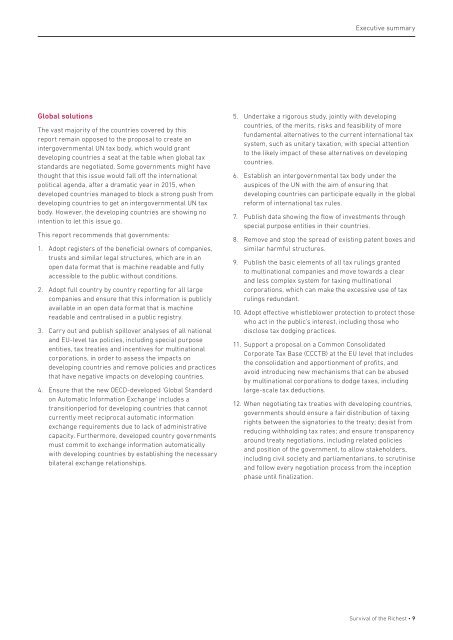You also want an ePaper? Increase the reach of your titles
YUMPU automatically turns print PDFs into web optimized ePapers that Google loves.
Executive summary<br />
Global solutions<br />
The vast majority <strong>of</strong> <strong>the</strong> countries covered by this<br />
report remain opposed to <strong>the</strong> proposal to create an<br />
intergovernmental UN tax body, which would grant<br />
developing countries a seat at <strong>the</strong> table when global tax<br />
standards are negotiated. Some governments might have<br />
thought that this issue would fall <strong>of</strong>f <strong>the</strong> international<br />
political agenda, after a dramatic year in 2015, when<br />
developed countries managed to block a strong push from<br />
developing countries to get an intergovernmental UN tax<br />
body. However, <strong>the</strong> developing countries are showing no<br />
intention to let this issue go.<br />
This report recommends that governments:<br />
1. Adopt registers <strong>of</strong> <strong>the</strong> beneficial owners <strong>of</strong> companies,<br />
trusts and similar legal structures, which are in an<br />
open data format that is machine readable and fully<br />
accessible to <strong>the</strong> public without conditions.<br />
2. Adopt full country by country reporting for all large<br />
companies and ensure that this information is publicly<br />
available in an open data format that is machine<br />
readable and centralised in a public registry.<br />
3. Carry out and publish spillover analyses <strong>of</strong> all national<br />
and EU-level tax policies, including special purpose<br />
entities, tax treaties and incentives for multinational<br />
corporations, in order to assess <strong>the</strong> impacts on<br />
developing countries and remove policies and practices<br />
that have negative impacts on developing countries.<br />
4. Ensure that <strong>the</strong> new OECD-developed ‘Global Standard<br />
on Automatic Information Exchange’ includes a<br />
transitionperiod for developing countries that cannot<br />
currently meet reciprocal automatic information<br />
exchange requirements due to lack <strong>of</strong> administrative<br />
capacity. Fur<strong>the</strong>rmore, developed country governments<br />
must commit to exchange information automatically<br />
with developing countries by establishing <strong>the</strong> necessary<br />
bilateral exchange relationships.<br />
5. Undertake a rigorous study, jointly with developing<br />
countries, <strong>of</strong> <strong>the</strong> merits, risks and feasibility <strong>of</strong> more<br />
fundamental alternatives to <strong>the</strong> current international tax<br />
system, such as unitary taxation, with special attention<br />
to <strong>the</strong> likely impact <strong>of</strong> <strong>the</strong>se alternatives on developing<br />
countries.<br />
6. Establish an intergovernmental tax body under <strong>the</strong><br />
auspices <strong>of</strong> <strong>the</strong> UN with <strong>the</strong> aim <strong>of</strong> ensuring that<br />
developing countries can participate equally in <strong>the</strong> global<br />
reform <strong>of</strong> international tax rules.<br />
7. Publish data showing <strong>the</strong> flow <strong>of</strong> investments through<br />
special purpose entities in <strong>the</strong>ir countries.<br />
8. Remove and stop <strong>the</strong> spread <strong>of</strong> existing patent boxes and<br />
similar harmful structures.<br />
9. Publish <strong>the</strong> basic elements <strong>of</strong> all tax rulings granted<br />
to multinational companies and move towards a clear<br />
and less complex system for taxing multinational<br />
corporations, which can make <strong>the</strong> excessive use <strong>of</strong> tax<br />
rulings redundant.<br />
10. Adopt effective whistleblower protection to protect those<br />
who act in <strong>the</strong> public’s interest, including those who<br />
disclose tax dodging practices.<br />
11. Support a proposal on a Common Consolidated<br />
Corporate Tax Base (CCCTB) at <strong>the</strong> EU level that includes<br />
<strong>the</strong> consolidation and apportionment <strong>of</strong> pr<strong>of</strong>its, and<br />
avoid introducing new mechanisms that can be abused<br />
by multinational corporations to dodge taxes, including<br />
large-scale tax deductions.<br />
12. When negotiating tax treaties with developing countries,<br />
governments should ensure a fair distribution <strong>of</strong> taxing<br />
rights between <strong>the</strong> signatories to <strong>the</strong> treaty; desist from<br />
reducing withholding tax rates; and ensure transparency<br />
around treaty negotiations, including related policies<br />
and position <strong>of</strong> <strong>the</strong> government, to allow stakeholders,<br />
including civil society and parliamentarians, to scrutinise<br />
and follow every negotiation process from <strong>the</strong> inception<br />
phase until finalization.<br />
<strong>Survival</strong> <strong>of</strong> <strong>the</strong> <strong>Richest</strong> • 9


